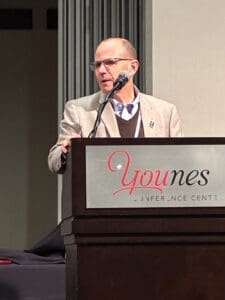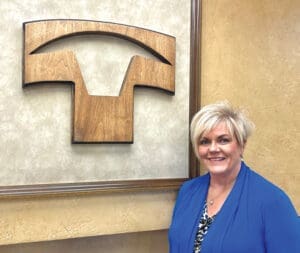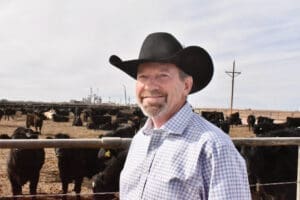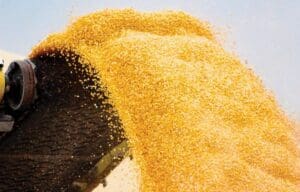By Patti Wilson Contributing Editor
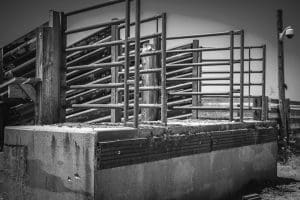
Mark Turney, DVM, is a high-energy guy. He requested a visit with CALF News, having some thoughts he wanted to share about his profession.
Our conversation was enlightening; his remarks were sage reminders to large animal producers about the way things are out where we live in the real world.
Turney grew up in rural Tennessee on a small, diversified farm. His family ran 30 cows, sparking interest in the youngster about livestock care. He describes their home as being so rural that his daily school bus rides were an hour and a half each way. As with most of us, he became involved in FFA and enjoyed livestock judging, including dairy.
He attended the University of Tennessee at Martin for his undergraduate work and moved on to Columbia State University where he completed his veterinary technician degree. His journey to becoming a veterinarian was bumpy. Not one to be discouraged, he applied to Ross University in the Caribbean to continue pre-clinical studies in veterinary medicine. The move was a good one for Turney, who graduated near the top of his class. He explains that students graduating from Ross were often admitted to mainland U.S. veterinary schools for a subsequent year of study, then granted their DVM degree. Better yet, he met his wife, Rebecca, at Ross University.
Turney and Rebecca completed their degrees at Texas A&M. He explains this roundabout way of becoming a vet is a good alternative for students who are capable and responsible, but not tuned in to subjects like physics, for example, that have little to do with livestock production. Some of the best veterinarians are not necessarily great students, but their value lies in knowing livestock and being able to diagnose and treat animals effectively.
When asked why he chose this profession, Turney exclaims that he, “didn’t know anything else!” He’d worked for a vet as a youth and realized one thing for sure – he loved it.
The Business
Upon graduation, he and Rebecca worked for a mixed practice before stepping out to open a mixed practice clinic of their own. They later became involved with a corporate partner, and after realizing that was not the way they wanted to run their business, sold out to the corporation. The Turneys subsequently established two separate, privately owned clinics, which suit them much better. Rebecca runs Eastbrook Animal Clinic for small animals at Waverly, and Turney runs K&M Veterinary Consulting at Tennessee Ridge.
The Future of Veterinary Business
Turney is deeply concerned about the future of veterinary practice. He says 70 percent of veterinary hospitals are now corporately owned. Corporations do not offer the personal service that individual vets provide. Turney claims he can take better care of his clients because he knows them, and he knows their farms. Often, corporate models provide only the minimum requirements for a veterinary/client/patient relationship (VCPR) that is mandatory for livestock operations receiving veterinary care.
Most interesting is his observation that he is regarded among many of his peers as a “service vet.” The term simultaneously annoys and amuses him, making him one who gets to do the dirty work of a useful veterinarian. Turney wears the term like a badge. Many vets now, he says, are primarily engaged in small animal practice or simply take orders and write prescriptions. Some are licensed to practice in several states, having the opportunity to sell an abundance of drugs and make big money.
Somehow, he laments, there has been a “changing of the guard.” Corporations in America, he states, have lost the desire to help people. Turney reiterated he wants to help both two- and four-legged critters.
Local Livestock, Local Business
Turney has a haul-in facility for large animals. He says it helps mitigate his costs and assures better care for his patients. Safety of clients and patients is enhanced, as well as advanced diagnostic abilities not available on farms. Interns are welcome at K&M Veterinary Consulting; they arrive from Mississippi State University and rotate through monthly. The University of Tennessee and Purdue University participate as well. Turney notes that the majority of students are women, and they do well, making a valuable addition to large animal practitioners.
In addition to beef cattle, he makes weekly visits to a 600-head dairy, doing routine checks and herd maintenance.
Their area of mid-Tennessee is mostly populated by stocker cattle, with some cow-calf operations. The large number of stockers in his area is sufficient to allow him to do studies on wormers, expanding the scope of his practice.
One looming problem continues to be a growing shortage of large animal vets. He stated that in order to have a thriving practice, one needs an adequate population of people as well as animals to generate support. Calls to his clinic come from an ever-expanding area, many counties in the state now being devoid of an appropriate vet. It complicates scheduling and puts livestock at risk, a situation no veterinarian wants to be in.
The admiration he feels for his clients continues today. Interacting with folks whom he describes as “salt of the earth,” as well as the animals gives a great deal of satisfaction. He ticked off his favorite patients [they are all large animals], and declares “the best are the people.”
Current Issues
As usual, the No. 1 problem in calves and stockers continues to be BRD, with 60 percent of fed cattle turning up with lung lesions at the packing plant. This, despite all the new and current drugs in use. We are having no more success with preventing and controlling BRD than we had 40 years ago.
New to Turney’s area are bovine influenza A, influenza B and coronavirus. He finds the virus dilemma very confusing, saying there’s been a 3 to 5 percent death loss in his locale, which can spike to 7 percent in late fall and early winter. In addition, small farms and auction markets, common in the area, can spell trouble with highly transmissible diseases such as PI BVD. The average cow herd in Tennessee numbers only 30 head. Positive PI’s will run one in 1,000 head of fed cattle, but one in 250 stockers.
The Turney family runs 400 mother cows and 1,000 grass yearlings of their own, employing two fulltime ranch hands. He says he lives his own animal health problems just like his clients.
Future Goals
Turney will continue to be heavily involved in cattle, small ruminants and equine, enjoying that work. His true passion is treating cow-calf and stocker cattle. As he grows older, his plan is to narrow that spectrum to cattle.
Family Life
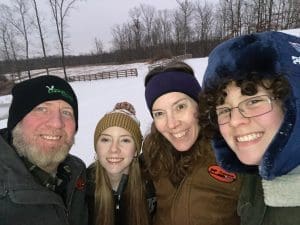
He and Rebecca have two daughters, Kaitlynn, 17, and Madelynn, 15. He says they are great help around the clinics and excellent volleyball players.
Being a veterinarian is a family legacy; his father-in-law, Matt Dikeman, is a vet in Texas, and fellow Texas A&M alumnus.
His final thought is, “In veterinary medicine, if there’s more than one way to treat something, that means all of them work or none of them do.”
Upon the conclusion of our interview, Turney was anxious to see his next patient, a burro that was down. I could nearly hear him trotting away to tend to his next case. He’s a service vet with a purpose.

